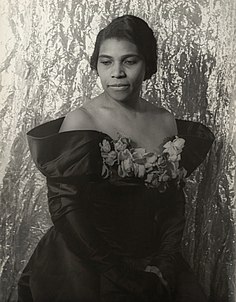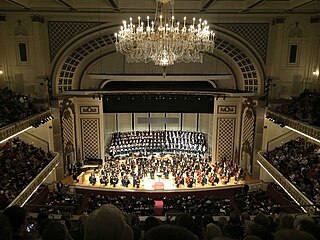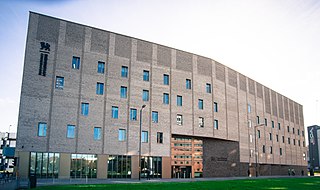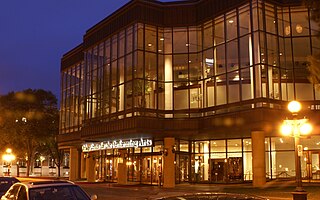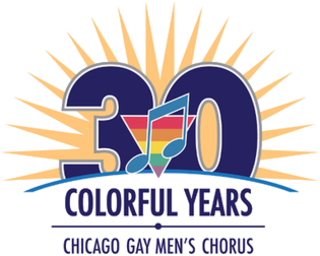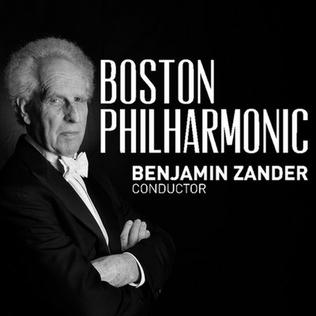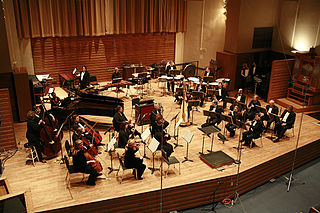This article needs additional citations for verification .(July 2012) (Learn how and when to remove this template message) |
The Orpheus Club is a men's singing club based in Philadelphia, the largest city in the state of Pennsylvania, United States, and is the oldest of its kind in the United States. [1] It was founded on December 7, 1872, when twenty-two members performed at the Musical Fund Hall on Locust Street in Philadelphia. [2]

Philadelphia, known colloquially as Philly, is the largest city in the U.S. state and Commonwealth of Pennsylvania, and the sixth-most populous U.S. city, with a 2018 census-estimated population of 1,584,138. Since 1854, the city has been coterminous with Philadelphia County, the most populous county in Pennsylvania and the urban core of the eighth-largest U.S. metropolitan statistical area, with over 6 million residents as of 2017. Philadelphia is also the economic and cultural anchor of the greater Delaware Valley, located along the lower Delaware and Schuylkill Rivers, within the Northeast megalopolis. The Delaware Valley's population of 7.2 million ranks it as the eighth-largest combined statistical area in the United States.

Pennsylvania, officially the Commonwealth of Pennsylvania, is a state located in the northeastern, Great Lakes and Mid-Atlantic regions of the United States. The Appalachian Mountains run through its middle. The Commonwealth is bordered by Delaware to the southeast, Maryland to the south, West Virginia to the southwest, Ohio to the west, Lake Erie and the Canadian province of Ontario to the northwest, New York to the north, and New Jersey to the east.

The United States of America (USA), commonly known as the United States or America, is a country comprising 50 states, a federal district, five major self-governing territories, and various possessions. At 3.8 million square miles, the United States is the world's third or fourth largest country by total area and is slightly smaller than the entire continent of Europe's 3.9 million square miles. With a population of over 327 million people, the U.S. is the third most populous country. The capital is Washington, D.C., and the largest city by population is New York City. Forty-eight states and the capital's federal district are contiguous in North America between Canada and Mexico. The State of Alaska is in the northwest corner of North America, bordered by Canada to the east and across the Bering Strait from Russia to the west. The State of Hawaii is an archipelago in the mid-Pacific Ocean. The U.S. territories are scattered about the Pacific Ocean and the Caribbean Sea, stretching across nine official time zones. The extremely diverse geography, climate, and wildlife of the United States make it one of the world's 17 megadiverse countries.
Contents
The club was first led by the American conductor Michael Hurley Cross (1833–1897), who was one of its original founders. Well over a century later, in 2012, the conductors of the group are John Shankweiler (Conductor) and Clyde R. Dengler, Jr. (Conductor Emeritus). [3] The Orpheus club performs its Christmas, winter and spring concerts at the Academy of Music in Philadelphia and at the Kimmel Center. Its Twelfth Night Revels performance is held at the Orpheus clubhouse on South Van Pelt Street each January.

Conducting is the art of directing a musical performance, such as an orchestral or choral concert. It has been defined as "the art of directing the simultaneous performance of several players or singers by the use of gesture." The primary duties of the conductor are to interpret the score in a way which reflects the specific indications in that score, set the tempo, ensure correct entries by ensemble members, and "shape" the phrasing where appropriate. Conductors communicate with their musicians primarily through hand gestures, usually with the aid of a baton, and may use other gestures or signals such as eye contact. A conductor usually supplements their direction with verbal instructions to their musicians in rehearsal.
Emeritus, in its current usage, is an adjective used to designate a retired chairman, professor, pastor, bishop, pope, director, president, prime minister, rabbi, or other person.

Christmas is an annual festival commemorating the birth of Jesus Christ observed on December 25. as a religious and cultural celebration among billions of people around the world. A feast central to the Christian liturgical year, it is preceded by the season of Advent or the Nativity Fast and initiates the season of Christmastide, which historically in the West lasts twelve days and culminates on Twelfth Night; in some traditions, Christmastide includes an octave. Christmas Day is a public holiday in many of the world's nations, is celebrated religiously by a majority of Christians, as well as culturally by many non-Christians, and forms an integral part of the holiday season centered around it.


